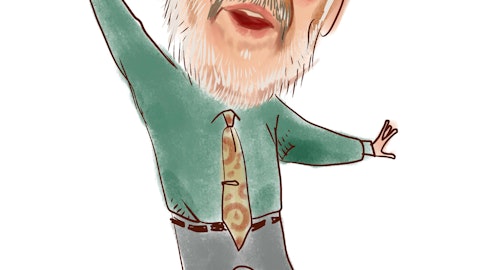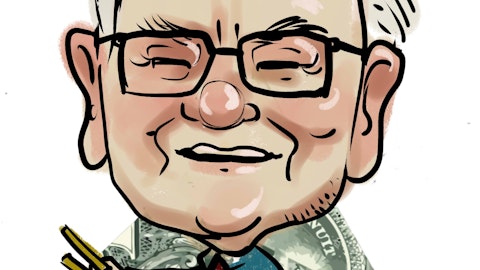Like all investors, I pay attention to what Warren Buffett is doing, not least because he has the ability to move the markets, which can be handy in formulating an investment strategy. However, recently I was surprised by his increased position in DIRECTV (NASDAQ:DTV)
DirecTV could be a good investment, income and cash flows are growing while the company continues to increase investor returns. However, there is one thing that worries me and that is company debt.
DIRECTV (NASDAQ:DTV)’s debt is growing rapidly, both on a numeric and gearing basis. (I should point out that DirecTV is forecast to start reducing its net debt position over the next few years. Although, I would be wary of this forecast as it is only a forecast and as of yet, the company has not shown any signs of reducing its debt. Indeed, as DirecTV has been rapidly increasing its debt, I would be inclined to believe that the company is more likely to increase its debt rather than reduce it in the future.)
DirecTV’s Debt

Net debt at DirecTV is rising rapidly, it is up roughly 700% since 2007 (left axis). The right axis is a gearing level of net debt to EBIT as a comparison.
Debt has been rising much faster than earnings, which has produced a worrying looking debt profile. Financing costs (blue) have roughly tripled since 2007 but low interest rates mean that the company is still paying a relatively low amount to finance its debt.
Why is debt rising?
So, why is debt rising at DIRECTV (NASDAQ:DTV), when the company has been generating very healthy cash flows over the past five years; free cash flow has been coming in at about $2 billion a year since 2009.
| $US Millions | 2007 | 2008 | 2009 | 2010 | 2011 |
| Cash flow from operations | 3,645 | 3,910 | 4,431 | 5,206 | 5,185 |
| Cash flow from investing | -2,822 | -2,388 | -2,194 | -3,099 | -3,022 |
| Free Cash Flow | 823 | 1522 | 2,237 | 2,107 | 2,163 |
| Cash flow from financing | -2,239 | -600 | -1,637 | -3,210 | -2,792 |
| Net Change In Cash | -1,420 | 922 | 600 | -1,100 | -629 |
It appears that all of DirecTV’s free cash is being spent by the company on financing activities.
A more detailed look at the company’s financing cash flow reveals the flowing:
| Change in Capital Stock | -1,900 | -3,070 | -1,660 | -5,070 | -5,500 |
| Debt Issuance (Buyback) | -339 | 2,420 | 207 | 2,070 | 2,780 |
| Cash flow from financing | -2,239 | -600 | -1,637 | -3,210 | -2,792 |
DirecTV is spending 200% of its free cash flow on stock buybacks. In fact, as the company is spending twice as much as it is earning on buying back stock, DirectTV is having to issue debt to pay the balance.
In particular, DirecTV spent $5.5 billion on buying back stock in 2011, which was about double the cash the company had available. So, as shown above, DirecTV issued $2.7 billion in debt to finance the part of the buyback it could not afford. This has been occurring since 2009 – DirecTV was buying back stock before 2009 but it was not borrowing as much to finance the buyback.
Personally, I believe that borrowing money to buy back stock does not make much sense. Especially, when the company has negative shareholder equity (total company liabilities are larger than total company assets) and the share price is reaching an all time high.
| $US Billions | 2010 | 2011 | 2012 |
| Total Assets | 17.9 | 18.4 | 20.5 |
| Total Liabilities | 17.9 | 21.3 | 25.6 |
| Total Shareholder Equity | -0.2 | -3.1 | -5.4 |

DirecTV’s share price is reach record highs and the company keeps borrowing money to buy back stock.
Competitors
So what do DirecTV’s finances look like when compared to its competitors in the sector? Is DirecTV the only company that has this large amount of borrowing or it is universal across the sector?
Comcast Corporation (NASDAQ:CMCSA)
| $US Millions | 2008 | 2009 | 2010 | 2011 | 2012 |
| Net debt | 31,202 | 28,375 | 25,350 | 37,689 | 28,000 |
| Financial costs | -2,439 | -2,348 | -2,156 | -2,505 | -2,520 |
| EBIT | 6,732 | 7,214 | 7,980 | 10,721 | 12,200 |
| Net Debt vs. EBIT | 4.6 | 3.9 | 3.2 | 3.5 | 2.3 |
| Cash flow from operations | 10,231 | 10,281 | 11,179 | 14,345 | 14,850 |
| Cash flow from investing | -7,477 | -5,897 | -5,711 | -12,508 | -1,500 |
| Free cash flow | 2,754 | 4,384 | 5,468 | 1,837 | 7,530 |
| Cash flow from financing | -2,522 | -4,908 | -155 | -6,201 | -4,040 |
| Net change in cash | 232 | -524 | 5313 | -4364 | 9,330 |
Comcast is larger than DirecTV and its biggest competitor. Comcast has a much better balance sheet and cash flow than DirecTV. Starting with debt, Comcast has seen both increases and decreases in its net debt position, recently however, the company has been reducing its net debt to EBIT level as profits rise while net debt falls.
Comcast’s EBIT has almost doubled since 2008; net debt in relation has remained relatively stable. Net debt to EBIT has fallen from 4.6 times to 2.3 last year.
In addition, Comcast’s cash flow is stronger than DirecTV’s. While Comcast’s net operating cash flow is almost triple that of DirecTV, the company is not spending all of its free cash on share buybacks. Comcast’s net financing cash flow for 2012 was -$4,040 million, of which $2,800 million was share buybacks and $1,600 million was dividends. Comcast also re-organized a portion of its debt to take advantage of lower interest rates.
Not only does Comcast has a much better debt profile than DirecTV but the company is also utilising its cash and cash flow in a more effective way, which is producing better shareholder returns.
Viacom, Inc. (NASDAQ:VIAB)
| $US Millions | 2008 | 2009 | 2010 | 2011 | 2012 |
| Net debt | 7,210 | 6,475 | 5,915 | 6,344 | 7,301 |
| Financial costs | -514 | -440 | -435 | -419 | -425 |
| EBIT | 2,977 | 2,937 | 2,943 | 3,854 | 3,901 |
| Net Debt vs. EBIT | 2.4 | 2.2 | 2.0 | 1.6 | 1.9 |
| Cash flow from operations | 2,036 | 1,151 | 1,147 | 2,644 | 2,498 |
| Cash flow from investing | -571 | -274 | -168 | -227 | -256 |
| Free cash flow | 1,465 | 877 | 979 | 2,417 | 2,242 |
| Cash flow from financing | -1,555 | -1,388 | -436 | -2,227 | -2,413 |
| Net change in cash | -90 | -511 | 543 | 190 | -171 |
Viacom’s balance sheet is once again, in a much better position than DirecTV. Viacom’s net debt position has not fallen or risen over the past five years. In addition, over this period the companies EBIT has grown, which has resulted in a falling EBIT value – in fact it is the smallest ratio in the group.
Looking at Viacom’s cash flow, the company is following the same path as Comcast. Viacom has a strong free cash flow and the company is utilizing this to buy back stock, issue dividends and buy back debt. These activities are well managed and the company is only spending what it earns, which gives the company a relatively balanced cash inflow/outflow ratio.
Comcast and Viacom look to be better at cash management and debt reduction, what about growth and return on equity?
Growth and ROE
| ROE average last 5 years | EPS growth past 5 years | Sales growth last 5 years | Profit Margin | |
| Comcast | 8.40% | 16.30% | 17.50% | 13.40% |
| Viacom | 20.60% | 16.40% | 16.40% | 17.10% |
| DirecTV | 59.00% | 25.40% | 13.10% | 9.40% |
I believe ROE is one of the best ways to measure a company’s returns for shareholders. DirecTV has achieved the best ROE over the last five years, although I would be skeptical of this figure as DTV’s shareholder equity has actually been negative since 2010- as I have mentioned above.
DirecTV has achieved the best EPS growth due to its large stock buybacks. Comcast and Viacom have both achieved a larger sales growth than DirecTV. Furthermore, both Comcast and Viacom have achieved much better profit margins, with Viacom’s profit margin being almost twice that of DirecTV’s.
Overall
So overall, DirecTV is borrowing lots of money to buy back stock, while its share price is reaching five year highs and shareholder equity is negative. Not only is this wasting hard earned shareholder cash but the company is significant increasing its debt to EBIT ratio, which could put huge pressure on the company’s cash flow in future years if sales start to stagnate or interest rates rise.
On the other hand, both Comcast and Viacom are utilizing their shareholders cash in more constructive ways, returning cash to shareholders through both dividends and buybacks, without borrowing huge amounts of cash.
All in all, DirecTV may be Buffett’s favourite but it is not mine.
Data Source: Saxo Capital Markets, Marketwatch
The article Buffett Likes DirecTV, But Should You? originally appeared on Fool.com and is written by Rupert Hargreaves.
Copyright © 1995 – 2013 The Motley Fool, LLC. All rights reserved. The Motley Fool has a disclosure policy.





